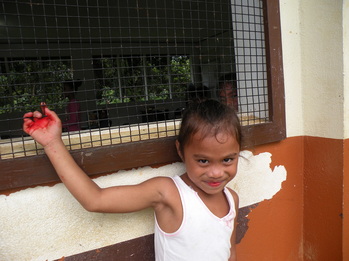 We are out of the classrooms this week as the schools have Monday and Friday off and Finals Tuesday-Thursday. We are taking this time to compile all our data collected in the schools so far and plan how we will attempt to reform the problems we have confronted. I thought I could take this break from reports in schools to write about nutrition here in Pohnpei. It’s no secret that the average Pohnpeian does not keep a healthy diet. Prior to colonization, they were subsistence farmers, eating a diet of fish, taro, bananas and other local food. With the drastic change in lifestyle has come a drastic change in diet. While there is still an abundance of fresh local food, the islanders taste buds now prefer ramen noodles, soda, Kool Aid, canned meats and turkey tail (which has 13x more fat than the rest of the turkey). As a result of these diet choices, Pohnpei and the other three states in the FSM have some of the highest rates of diabetes per capita in the world. It is not unusual to see individuals with limbs amputated from the disease.
One of the biggest issues is the lack of basic health education. MAHI has made efforts to bring this education to the islanders but obviously it is an uphill battle. I think the best way to paint the picture of the severity of the situation is a few scenes I have witnessed. On our first site visit, I saw the girl in the attached picture, licking her hands. Her hands were bright red, but it clearly wasn’t blood as it looked like some sort of powder. I asked John and he told me it was Kool Aid mix. Since that first girl I have seen countless kids walking around licking their hands. A common lunch is dry ramen mixed with Kool Aid. I have been told that kids die every year from renal failure as a result of this diet.
Another scene occurred when I picked up Mr. B the other day. A girl about ten-years old was walking to school drinking a can of soda. Apparently soda is a common breakfast. Perhaps the most shocking scene though was a parent giving her baby a lollipop to suck on instead of a pacifier. While this might invoke outrage, I don’t get the impression that this harm is done intentionally. I truly believe that many of the islanders, particularly the parents feeding their children, don’t know the negative effects of this diet, or at least the severity of the consequences. Compounding this diet is the lack of other basic health knowledge such as the importance of brushing your teeth and regular exercise.
It’s easy to look at the current problems and blame the islanders for their lack of knowledge. But if you look at the history, it’s difficult to blame anyone besides the United States. Prior to the US occupation of Micronesia, the islands were colonized by Spain, Germany and Japan. It wasn’t until the US flooded these islands with sweets that these problems emerged. After studying and spending some time on the Navajo reservation in Arizona, it is clear that Micronesians and Native Americans face many of the same issues. Ultimately, what they share in common is the curse of government handouts. This deserves another post or two, but I feel it is appropriate to put the complex issue of nutrition here in Pohnpei and throughout the FSM in the proper context.
One of the most common questions I received prior to arriving in Pohnpei and since is what I eat. I’m going to hold you in suspense until my next post, which includes video of me sampling a local delicacy…
For now, check out the videos below of some jumps off the Lehn Paipohn Waterfall this past weekend. Sorry mom!
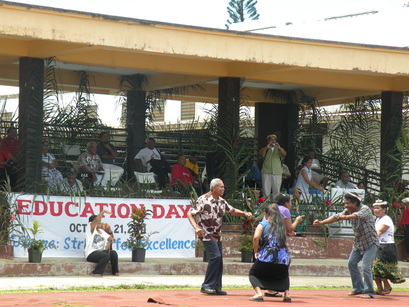 Today, Friday, is Education Day here in Pohnpei. The theme this year is “Striving for Excellence.” To celebrate, school was canceled and all the teachers and administrators gathered at a field to sing and dance.
I really don’t know how to follow that.
We have conducted reading assessments in Grades 6, 7 and 8 in three schools so far. I just crunched the numbers and here are the results so far:
83.5% of students are reading below grade level
31% of students are reading 4 grades or more below grade level
11% of students are reading at Kindergarten level or below, including four illiterate students
More results to come.
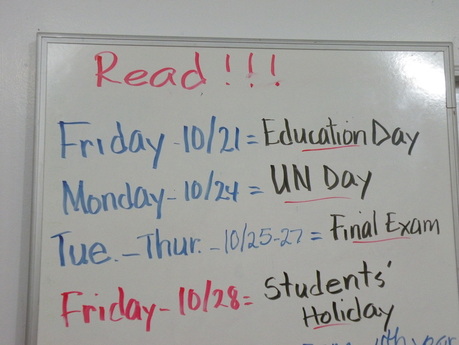 Not only are the schools off this Friday for Education Day, they are also off Monday for UN Day and next Friday for a "student holiday." On the school calendar only Friday 10/28 is recognized as an official "holiday." (On a more lighthearted note, check out these pictures from this past weekend. Went on the epic Six Waterfalls Hike deep in the jungle and went bottom fishing!)
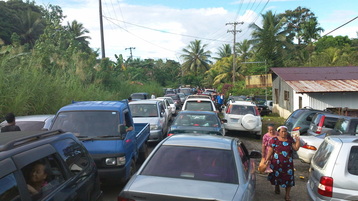 You would think that an island without a traffic light would not have traffic problems. But if you believed this, you would be wrong. This past week I was able to experience a Pohnpeian traffic jam when we drove by a funeral. Here, funerals are a big deal. They are not a few hour event with families and friends visiting. Often, funerals last a week or more, with the entire community attending. This past week there was a funeral down the road from us. A trip that usually takes 10 minutes or so took over 45 minutes, all from one 100-yard stretch of road. Another thing about Pohnpei is that there are crazy drivers everywhere and many don’t know how to park. In this case, what resulted was an already narrow road having cars parked on both sides, leaving an extremely narrow one-lane road with two lanes of traffic.
While this scene in an American city would produce a bunch of road raged maniacs honking horns and throwing certain hand gestures, everyone was pretty much calm. Sitting in the back of the MAHI pickup truck, I had a good vantage point to observe the culture. I learned previously that bringing a pig to a funeral is a major sign of respect. Thus, I wasn't too surprised to see cut up pigs on the side of the road. Though the men covered in blood holding machetes was a bit disconcerting. Women and children were walking past the cars carrying various pig parts. Seeing a little girl carrying a box with a couple of pig hooves might take some getting used to. The entire spectrum of ages was present, from children running around naked (something seen every day), to the elderly. Elections are coming up, so there likely has been politicians attending all the funerals, especially of the affluent families.
Although it might seem like a nice cultural tradition for funerals to last longer, gathering the entire community to remember someone and pay respects, there are downfalls. The largest one of these is the financial burden put upon the family hosting the funeral. For a family barely scraping for basic necessities, the costs of feeding their entire community for a week can put them in debt for years. I suppose another downfall could be the traffic!
Overall, transportation on Pohnpei deserves a post of its own. Let’s just say for now I’m glad I haven’t gotten stuck in a pothole…yet. I'll be writing soon about the progress in the education project. We have been very busy and there's a lot to report!
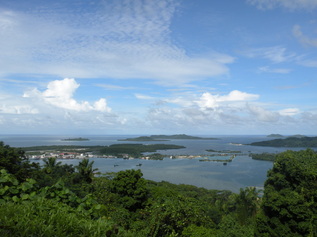 As my past couple posts have dealt with serious issues in Pohnpei I want to write about how I have started to love this place and the people here. There have been several moments throughout my time so far when it has hit me how blessed I am to be here and how glad I am that the majority of my time is not spent sitting inside a cubicle. While I am volunteering my time and services I have found that I am being compensated in far better ways than dollars and cents. One of the major perks of working here in Pohnpei is the natural beauty everywhere. Without rubbing it in to those wearing jackets and soon sweaters, I’m living in a screensaver. I realized that at night outside my window sounds exactly like the jungle sounds you would buy on a CD. I have been able to enjoy much of what the island offers to outdoorsmen. Already I have been fishing twice and look forward to catching a fish taller than me. This weekend I jumped off my first waterfall (see video below!). I’m looking forward to jumping off the next one, which is twice as tall! In the coming months I will be camping on outer islands, likely go sailing, learn to surf, go scuba diving and snorkeling in pristine waters, and hike to the highest point in Pohnpei, Sokeh’s Ridge. Also, as a World War II history buff, I had a real treat this weekend. A local guy completely restored an old Japanese tank and gave us a complete tour. I’m told that if we become friends he’ll give me a ride around his local compound. We’ll have to be careful how far we go though – the US Embassy is across the street! Later in the day John took us up a mountain to see some huge Japanese anti-aircraft guns. All in all, there has been much to enjoy on the weekends and after work. Despite all this fun, the best part of being here has been the people. The entire MAHI team has been so welcoming and kind. I feel blessed to be part of a group that is so committed to doing God’s work. The locals have also been very welcoming. If you wave at the toughest, meanest looking guy on the island, he will wave back, and most likely with a big smile. Now trying doing that anywhere in America! You would probably get a hand gesture with a significantly different meaning. In every conversation and interaction, they speak very softly, not with the volume of their voice but with kindness and inflection. I have found that this rubs off on the non-locals, including myself. Even though people have struggles just like anyone anywhere else in the world, my experience so far has shown that the locals don’t get too frantic. Indeed, while the lack of urgency to many of their problems can be detrimental, it certainly is a nice change of pace from the world of 24 hour news networks, blowing up everything out of proportion in search of the almighty dollar. I’m sure throughout my time here there will be plenty of other things that will make me grateful for the opportunity to have this experience. I wanted to write this post though to make known that while there is much reform needed here in Pohnpei and throughout Micronesia that this is a beautiful place with wonderful people. Click here to see pictures of the weekend!
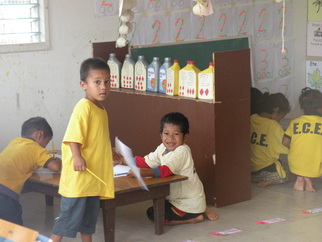 The vast majority of my time spent here in Pohnpei is going to be focused on improving the education system. I will be working closely with Mr. Miller Benjamin, MAHI’s Senior Educator. Mr. B has over 30 years of education experience on the island, after recently retiring as Principal from the SDA School here. His knowledge of the culture and education in Pohnpei will be invaluable on our mission. I am extremely excited to work with him. On Wednesday, John, Mr. B and I visited the seven lowest performing public schools on Pohnpei. Our eyes were opened to many of the problems we are going to face over the coming school year. There are many different areas we can focus our efforts, but we have decided to concentrate on reading and writing. We have learned through several teachers and following our intuition, that students cannot learn mathematics, science, or any other subject, unless they can read and write on grade level. Perhaps the biggest obstacle to getting students to read on grade level is when they start learning in English. In Grades 1-3 students are taught in Pohnpeian. What we found is that every grades curriculum is three years behind, so that a Grade 8 student is reading on a Grade 5 level. The situation is more severe than this however. When students start learning in English in Grade 4 it is not an instantaneous shift. Questions and explanations are still in Pohnpeian and it is not until Grade 6 or so at best when English is the primary language heard in the classroom. We will be conducting assessments to see exactly at what level the students are reading. I am fairly confident the majority of students will be at a minimum of 3-4 years behind. The obvious solution is to start teaching students in English beginning in First Grade but many in the Department of Education are opposed to such a policy change as they fear the loss of culture in the youth speaking their native language. Although their sentiments are understandable, the fact of the matter is that the policy is causing the students to fall behind for the rest of their education. While Pohnpeian is a beautiful language, it would undeniably be to the youth’s advantage for them to start learning in English at the start of their education. Pohnpeian is only spoken on this island, and their ability to read, write and think in English is critical to their future success and prosperity. Beyond the policy decision to delay learning in English, there are many other problems in the education system in Pohnpei. In many of the schools we visited, they were lacking in basic supplies, particularly textbooks. We found textbooks from the 1980s and many schools without enough books. Another key educational resource was also missing – teachers and administrators. Every other week the principals of all the schools are gone for a whole day attending meetings in Kolonia. Apparently, meetings in all sectors of government are very popular in Pohnpei. Also, several teachers were not present as they were attending workshops. Why they don’t have these meetings and workshops in the summer is beyond me. Several times, I had to step back and wonder where to even start in tackling these problems. While these site visits were very informative, we still have much to learn about these schools. We will be conducting assessments of the teachers and the teachers will be assessing themselves and their administrator(s). After this we will be conducting student reading assessments to find their reading level. Before we can help them, we have to know where they are, assessing the “damage” in a sense. Moreover, in assessing the teachers and administrators, we will have a better idea of the organizational integrity of the school and how to best assist and instruct them. I only touched the tip of the iceberg with the problems facing us in our efforts to raise the reading and writing levels at the seven schools we have adopted, but this is a cursory glance of what the main issues are from our first impression. Ideally, we will be able to dramatically improve the level of teaching and administration at these schools, thus increasing the level of reading and writing at all grade levels. Furthermore, this would be a sustainable program, as the teachers would remain in the schools year after year to continue being successful teachers. The educational world is in agreement that the most valuable education resource is the teacher. If we can produce great teachers on Pohnpei, we will have taken the largest and most critical step in providing the youth of Pohnpei with a quality education. These seven schools are only a trial run – hopefully we can expand it to all 35 public schools on the island. My ultimate dream for these schools, and for all of Pohnpei, is for a culture of achievement to spread throughout the island, originating in the schools from students seeking to fulfill their infinite potential by pursuing their education. I have no illusions that this dream will be easy and without obstacles. Indeed, it will be a long, arduous venture that will likely extend beyond my time here. But as Lao-Tzu famously said, “Even the longest journey begins with a single step.” Click here to see pictures from the site visits!
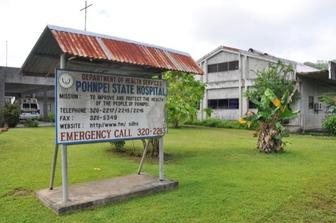 Photo courtesy MAHI International Today was an interesting day, visiting many of the places I will be working in Kolonia and meeting people I will be collaborating with on various education projects. Throughout this time I took advantage of the opportunity to pick John’s brain particularly about work culture in Pohnpei and the many obstacles he has confronted during his eleven years so far on the island. What will stick out in my mind about today though is our visit to the Pohnpei State Hospital. The education initiative of MAHI is actually a recent development, as the majority of their work has focused on basic human services including healthcare. A large 40-foot container organized by John in the States is scheduled to arrive in about a month filled with hospital beds, bassinets, exam tables and many other medical supplies for the hospital. MAHI has also worked on construction projects in the hospital, such as recently converting storage rooms into private rooms for patients. While MAHI’s past work in the hospital has been very helpful, the current state of the facilities is simply shocking. On the whole, the building looks like it hasn’t been touched since the 1940s. Rust coats many of the metal instruments. Ants cover many areas of the floor. Less than twenty yards from the ER ward, the ceiling was rotting away and dripping from a leak in some area of the buildings structure. All in all, the entire building was just dirty; even the sign in front is covered in rust. More than just the building itself, the hospital is lacking basic supplies. None of the beds have any sheets on them since previously they disappeared when patients were discharged. John told me that much of the hospital is without soap as, like the sheets, employees and patients took the soap home. (I will have a separate post in the future about the Pohnpeian tendency to have supplies, such as school textbooks, disappear never to be seen again). Perhaps someday I will post pictures of what I saw today, but I really don’t think pictures will do the scene justice. Vast improvements are needed but like in most of the world, change is really hard. Indeed, I’m sure I will experience many frustrations with the lack of progress, or at least the speed of any progress, during my time in Pohnpei. The phrase often used is “island time.” To get anything done, whether trying to get information from a government agency, get Internet expanded in your home, or even pay for an item at a store –takes forever. A great example is John trying to get power to the house he built. It literally took three years and that only happened with a stroke of luck and a lot of perseverance. Despite the awful state of the hospital and the often stagnant to slow pace of progress, it is encouraging that progress is possible through organizations like MAHI International. When there are people on the ground like John, Kat and all those who support MAHI whether through volunteering their time or resources, change is not only possible, it’s inevitable. This change isn’t fast or easy, but after seeing how driven the MAHI team is and how much of a heart they have for service; it’s clearly evident that no obstacle is insurmountable. I hope I can cultivate such a passion during my time here and I am excited to help improve the education system, ready to tackle all the obstacles undeniably waiting for me.
Greetings from Pohnpei! “Kaselehie” means hello and goodbye in Pohnpeian, like Aloha or Ciao. I had stumbled across this word many times before I came here and had no idea how to pronounce it. Go ahead, take a guess. The correct way is “ casa-lay-lee-ah” with the casa pronounced like the Spanish word for “house.” The past few days have been a whirlwind. Tremendous jetlag + experiencing massive culture shock for the first time is a brutal combination. My body is starting to know what time it is though and I’m learning more about the culture every day. I’m living with two roommates, Dale and Ian, who are really cool guys and have been very helpful in the transition process, answering a lot of questions and teaching me more about the culture. They are working on emergency management and public safety issues while they’re here. Upstairs is Kat and the resident three-year old, Kai. In a day or two John will be coming back from the states, which everyone is looking forward to. On Friday I met Mr. Benjamin, aka Mr. B, who I will be working closely with on the Professional Growth for Educators project. We will be working with seven schools across the island conducting assessments and looking to see how we can best help them. We are hoping to secure more funding so that we can expand the number of schools. Speaking of which, I will also be working on grant writing while I’m here. Somehow everyone thinks I’m a professional grant writer. I don’t know how that misconception started, but they need a professional grant writer so I suppose the only thing to do is step up to the plate and do my best! There’s so many things to write about I don’t even know where to begin. Here’s a quick piece of culture – when waving someone to come over to you, you need to be very careful of what hand gesture used. You’re supposed to wave someone over with your palm down, or if you’re feeling risky, sideways. If you wave someone over with your palm facing up it means, in politically correct terms, “Let’s go have sexual relations in the bushes.” I sure hope I don’t forget that one. Over the coming weeks, I will be writing more about Pohnpeian life and culture on topics such as transportation, food, social life, religion, politics, language, education, and infrastructure, to name a few. I’ll also be sure to post pictures as well. If there is anything you're particularly curious about, feel free to contact me. My full contact information is below and posted on the home page: Drew Robinson PO Box 2268 Kolonia, Pohnpei, FSM 96941 E-mail: [email protected] Skype: drew.robinson19
|








